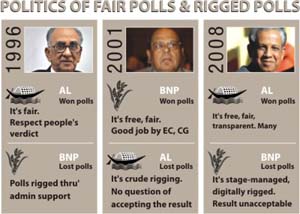 HIGHLIGHTS
HIGHLIGHTS
o 13th amendment unconstitutional
o Caretaker govt may hold next 2 JS polls for ‘safety’
o Judges may be kept out of caretaker govt
The Supreme Court has declared illegal a 15-year-old constitutional provision that mandates an elected government to transfer power to an unelected non-partisan caretaker administration to oversee a new parliamentary election on completion of its term.
In the same verdict yesterday the highest court said the voided system may be practiced for another two parliamentary terms for the sake of “safety of the state and its people”.
The court also asked the parliament to amend the constitution to make sure that former chief justices or any other Supreme Court judges are not chosen as heads of caretaker governments in case the system is kept for another two parliamentary elections.
A seven-member SC panel, headed by Chief Justice ABM Khairul Haque, reached the verdict on majority vote.
It thus also rejected a 2004 High Court ruling that upheld the 13th amendment to the constitution which provides for a 10-member non-partisan caretaker government to take over following the dissolution of a parliament and resignation of an elected government on completion of its term.
A caretaker government runs the routine administration and assists the Election Commission in conducting the polls.
The High Court ruled the system legal after a Supreme Court lawyer M Salimullah challenged the 13th amendment in a writ petition saying the change distorts the principle that the republic will be governed by an elected government.
Salimullah since then died. Thereafter another Supreme Court lawyer Abdul Mannan Khan filed an appeal against the High Court ruling in the Supreme Court.
In its brief verdict yesterday the Supreme Court said, “The Constitution (Thirteenth Amendment) Act, 1996 (Act 1 of 1996) is prospectively declared void and ultra vires the Constitution.”
“The election to the Tenth and the Eleventh Parliament may be held under the provisions of the above mentioned Thirteenth Amendment,” it said.
“The parliament, however, in the meantime, is at liberty to bring necessary amendments excluding, the provisions of making the former Chief Justices of Bangladesh or the Judges of the Appellate Division as the head of the Non-Party Care-taker Government,” the verdict added.
Introduced in 1996 through the 13th amendment to the constitution by a controversially elected parliament, the system of non-party caretaker government has seen the holding of three successful parliamentary elections in 1996, 2001, and 2008 that were considered free and fair by both local and foreign observers.
The immediate past chief justice is the first choice to become the head of a caretaker government with the formal title of chief adviser.
Two former chief justices, Justice Habibur Rahman and Justice Latifur Rahman served as chief advisers respectively in 1996 and 2001.
Fakhruddin Ahmed, a former governor of Bangladesh Bank, held the office to oversee the 2008 parliamentary voting after street protests, led by Awami League and its allies, forced then-president Iajuddin Ahmed to quit the post of the chief adviser.
The caretaker system was also hailed as appropriate for Bangladesh which has a history of bitter political hostilities and mistrust.
Awami League, led by then opposition leader Sheikh Hasina, pioneered the movement for introducing the non-partisan caretaker system.
Her bitter rival Khaleda Zia, then the prime minister, vehemently opposed it.
This time the Supreme Court verdict was welcomed by Awami League, the current ruling party. Opposition BNP said it will wait to give its reaction.
The verdict triggered mixed response among lawyers with some calling it contradictory and Attorney General Mahbubey Alam hailing it.
Mahbubey Alam said the verdict is “right in principle”. The next two parliamentary elections will be held under caretaker governments if the constitutional provisions are not amended, he said.
If the next two elections are not held under caretaker governments, chaos and unrest will take place in the country, he added.
Senior lawyers Barrister Rafique-ul Huq and Khandker Mahbub Hossain, president of the Supreme Court Bar Association, termed the SC verdict self contradictory, saying that the SC declared the 13th amendment illegal, but suggested holding next two parliamentary elections under this law.
Barrister M Amir-ul Islam said the parliament has to play a responsible role in finding an alternative to the caretaker government system.
Barrister MI Farooqui, who stood for the petitioner, expressed satisfaction over the SC verdict, saying it is good for the nation and the constitution.
Earlier, the SC heard for 10 days opinions and arguments from eight amici curiae (friends of the court), and the counsels for both sides of the appeal.
Of the amici curiae, Dr Kamal Hossain, TH Khan, Mahmudul Islam, M Amir-Ul Islam, and Rokanuddin Mahmud gave opinions in favour of the caretaker government system.
However, two jurists — Rafique-ul Huq and Dr M Zahir — suggested alternatives to the system.
Amicus curiae Ajmalul Hossain, and the appellant’s counsels MI Farooqui and Mohsen Rashid placed arguments against the caretaker government system.
Courtesy of The Daily Star




















